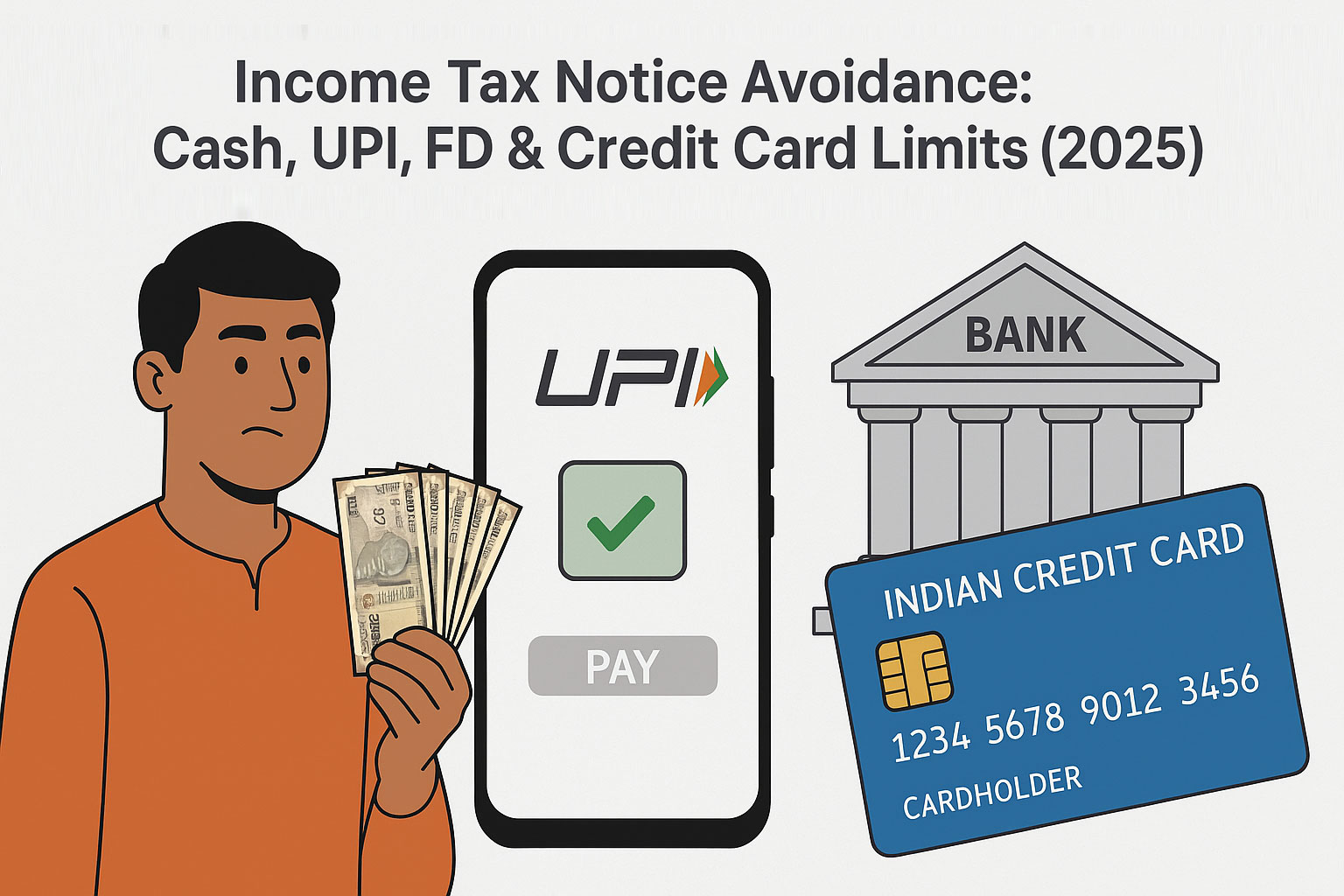Cash Deposit Rules 2025: How Much Cash Can You Deposit Without a Tax Notice?
With the growing use of digital transactions and increased surveillance by the Income Tax Department, taxpayers in India must stay aware of the latest cash deposit rules, UPI limits, FD thresholds, and credit card spending norms to avoid scrutiny or tax notices in 2025.
In this article, we’ll break down the latest cash deposit rules, safe limits for UPI transfers, fixed deposits (FDs), and credit card usage that can trigger an income tax notice.
Staying within these limits can help salaried individuals, business owners, and even freelancers avoid unnecessary legal troubles.
Cash Deposit Limit Without Income Tax Notice (2025)
The Income Tax Department tracks cash deposits beyond a certain limit in savings or current bank accounts. Exceeding these can raise red flags under the Annual Information Return (AIR) rules.
1. Cash Deposit & Withdrawal Limits in Savings Account
- Annual Limit: ₹10 lakh per financial year (total of deposits + withdrawals).
- Single Transaction Limit: ₹2 lakh. Anything more? Keep valid proof ready.
- Real Estate Transactions: Cash payments exceeding ₹20,000 are not permitted for property transactions.
What if you go over the limit?
- ITR filers: You’ll face a 2% TDS (Tax Deducted at Source) on the amount over ₹10 lakh.
- Non-filers or late filers: The TDS could go as high as 5%, plus penalties!
👉 Pro Tip: Try staying under ₹10 lakh in cash transactions annually, or maintain clean records to avoid tax complications.
2. Cash Limits in Current Accounts (For Business Owners)
Running a business? Then your current account has different rules.
- Annual Limit: ₹50 lakh.
- Daily Limit: Cash expenses over ₹10,000 a day won’t be counted as business expenses unless properly recorded.
Why does this matter?
Because if you can’t prove those expenses, they won’t be deductible, which means you’ll end up paying more tax.
3. UPI & Digital Payment Limits in 2025
Although UPI payments are digital and cashless, very high volumes or values of transactions can still draw attention from tax officials if they don’t match your declared income.
- Annual UPI Transaction Limit: ₹50,000 (includes both debit and credit).
- UPI Rewards & Cashbacks: If you earn more than ₹500 in a year, it counts as taxable income under “Income from Other Sources”.
- GST Alert: If your total UPI transactions cross ₹20 lakh annually, you might need to register for GST—even if you’re a freelancer or small seller.
👉 Pro Tip: If your UPI usage is high, it’s smarter to move these transactions to your current account.
4. Fixed Deposit (FD) Rules You Must Know
FDs are safe, but if you cross certain limits, they attract tax attention too.
- Reporting Limit: If you invest more than ₹10 lakh in FDs in a year, banks will report it to the Income Tax Department.
- Interest Income: Taxable if it crosses ₹40,000 in a year (₹50,000 for senior citizens).
👉 Solution: Keep your FD amounts aligned with your declared income to avoid red flags.
5. Credit Card Spending Limits
Your spending habits can also invite income tax scrutiny, especially if you’re swiping a lot.
- Alert Limit: Annual spends of ₹10 lakh or more could raise questions.
- Mismatch Problem: If your spending is higher than your declared income, the IT department may ask for supporting documents.
- Avoid This Trap: Rotating money between credit cards (paying one with another) is risky and may lead to penalties.
👉 Advice: Match your lifestyle with your income, and keep records of major expenses.
Tips to Avoid Income Tax Notices in 2025
Want to stay stress-free and away from tax troubles? Follow these simple but effective habits:
- File your ITR on time, even if you’re not earning much.
- Disclose all your income sources, including interest, cashback, and freelance gigs.
- Go digital, prefer UPI, bank transfers, or cards over large cash deals.
- Maintain proofs, especially for large deposits, withdrawals, or transfers.
- Avoid tricks like moving money in loops or using one card to pay for another.
The Tax Dept Has Super Senses Now: Every year, the government’s tax department (like a financial detective) gets better technology. They now use powerful AI (Artificial Intelligence) – like super-smart computer programs – to automatically track where your money comes from and where it goes (your “money trail”).
You Might Be Seen, Even If You Feel Hidden: You might think your financial moves are unnoticed, but these AI systems are always watching the data. They can automatically spot unusual patterns and flag your account for a closer look.
To stay safe and avoid nasty surprises:
- Always be truthful on your taxes.
- Know and follow the latest rules (especially for cash deposits, UPI payments, and credit card use in 2025).
This knowledge is your best protection against stress and getting flagged by the system.
— — —
Disclaimer:
This article is published for general legal awareness and informational purposes only, and should not be construed as legal advice or a solicitation to act.
About the Author:
Joginder Poswal is an advocate enrolled with the Bar and practicing law, specializing in cyber law, criminal law, and corporate compliance.
For more information, please refer to the contact details provided on this website.

